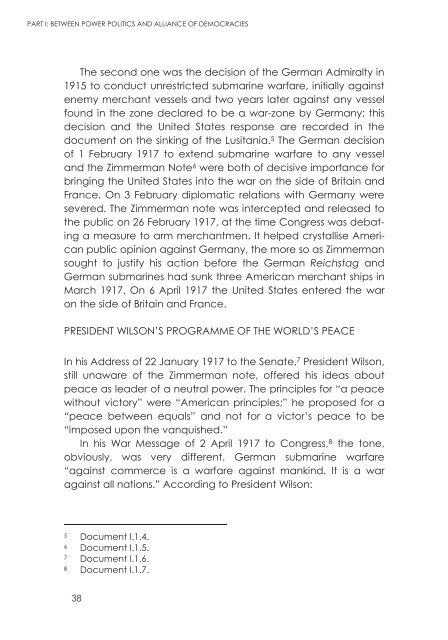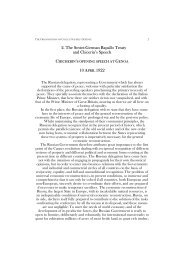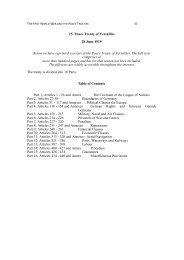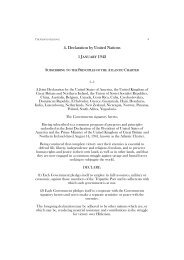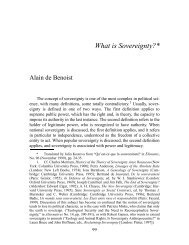CHAPTER 1 THE FIRST WORLD WAR AND THE PEACE TREATIES
CHAPTER 1 THE FIRST WORLD WAR AND THE PEACE TREATIES
CHAPTER 1 THE FIRST WORLD WAR AND THE PEACE TREATIES
You also want an ePaper? Increase the reach of your titles
YUMPU automatically turns print PDFs into web optimized ePapers that Google loves.
PART I: BETWEEN POWER POLITICS <strong>AND</strong> ALLIANCE OF DEMOCRACIES<br />
The second one was the decision of the German Admiralty in<br />
1915 to conduct unrestricted submarine warfare, initially against<br />
enemy merchant vessels and two years later against any vessel<br />
found in the zone declared to be a war-zone by Germany; this<br />
decision and the United States response are recorded in the<br />
document on the sinking of the Lusitania. 5 The German decision<br />
of 1 February 1917 to extend submarine warfare to any vessel<br />
and the Zimmerman Note 6 were both of decisive importance for<br />
bringing the United States into the war on the side of Britain and<br />
France. On 3 February diplomatic relations with Germany were<br />
severed. The Zimmerman note was intercepted and released to<br />
the public on 26 February 1917, at the time Congress was debating<br />
a measure to arm merchantmen. It helped crystallise American<br />
public opinion against Germany, the more so as Zimmerman<br />
sought to justify his action before the German Reichstag and<br />
German submarines had sunk three American merchant ships in<br />
March 1917. On 6 April 1917 the United States entered the war<br />
on the side of Britain and France.<br />
PRESIDENT WILSON’S PROGRAMME OF <strong>THE</strong> <strong>WORLD</strong>’S <strong>PEACE</strong><br />
In his Address of 22 January 1917 to the Senate, 7 President Wilson,<br />
still unaware of the Zimmerman note, offered his ideas about<br />
peace as leader of a neutral power. The principles for “a peace<br />
without victory” were “American principles;” he proposed for a<br />
“peace between equals” and not for a victor’s peace to be<br />
“imposed upon the vanquished.”<br />
In his War Message of 2 April 1917 to Congress, 8 the tone,<br />
obviously, was very different. German submarine warfare<br />
“against commerce is a warfare against mankind. It is a war<br />
against all nations.” According to President Wilson:<br />
5 Document I.1.4.<br />
6 Document I.1.5.<br />
7 Document I.1.6.<br />
8 Document I.1.7.<br />
38


